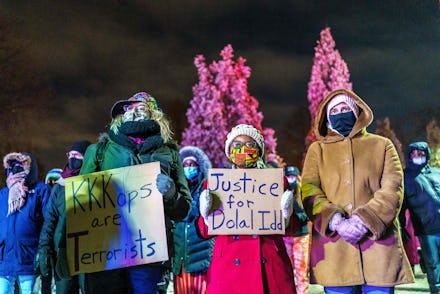The police killing of Dolal Idd in Minneapolis has brought new pain on the city

Protesters in Minneapolis are demanding justice for 23-year-old Dolal Idd, whom police killed in the early evening of Dec. 30. Police released body camera footage of the killing the following day, New Year's Eve, insisting that their shooting of the young man was justified as a self-defense move. For Minneapolis residents, Idd's family, and activists protesting the Minneapolis Police Department, the killing is a heartbreaking loss that further signals the need for a change in policing. Idd was a Black man of Somali dissent.
On Dec. 30, police said they attempted to conduct a traffic stop outside a gas station. Idd was in the driver's seat of the car, police said, and police also said that a responding officer's body camera footage indicates that a gun was fired first from inside the car. After that, police say, officers returned fire, shooting at the car and killing Idd. (No police officers were hurt, nor was the passenger in the car with Idd.) Later that evening, Minneapolis police executed a search warrant at the home where Idd had lived with his parents and siblings, looking for weapons Idd may have had there. According to the Sahan Journal, police tied cords around the hands of Bayle Adod Gelle, Idd's father, as well as Gelle's wife, and refused to tell them what they were searching for. Gelle told the Sahan Journal that the police did not take any evidence with them when they left. Only at the end of the search did officers show Gelle the warrant and tell him that they had killed his son earlier that evening, Gelle said.
"He was just sitting in the car," Gelle said, per local CBS affiliate WCCO-TV. "And bullets were shot at him, and no reason. Why are we here? Because why were they shooting? Because of color. He is a Black man." He added, "We need justice." Supporters of Idd and his family have disputed the police's claim that the footage shows bullets coming from inside the car first.
Minneapolis residents calling for justice rallied Sunday to demand that the police officers who shot at Idd's car and ultimately killed him be held to account. "We want police officers to have serious consequences for their use of force. Right now they don't," said Jaylani Hussein, the executive director of the Minnesota chapter of the Council on American-Islamic Relations (CAIR). "Right [now] they're given a great deal of discretion to kill people."
Hussein added that the immediate police response to perceived threat or suspicion of illegal behavior should not be the killing of possibly innocent people. "Regardless of the criminality or the history … people are people, and we need to take that into consideration," he said.
Idd's death was the first police killing in Minneapolis since the May 25, 2020, killing of George Floyd, which kicked off a summer of nationwide protests against racist policing in America. In response to the police killing of Floyd, Minneapolis residents poured into the streets, and the Minneapolis City Council pledged to address systemic issues with policing. But seven months later, the city council had still not significantly defunded, let alone abolished its infamous police department as it once looked might happen. By the end of 2020, the city council and Minneapolis Mayor Jacob Frey (D) had only approved a $7.7 million cut from a $179 million police budget.
"I am working closely with [Minneapolis Police Chief Medaria Arradondo] to gather all the facts surrounding what happened tonight and will be relaying that information, in coordination with state partners, to community as quickly as possible," Frey said in a statement posted to Facebook. "We must all be committed to getting the facts, pursuing justice, and keeping the peace."